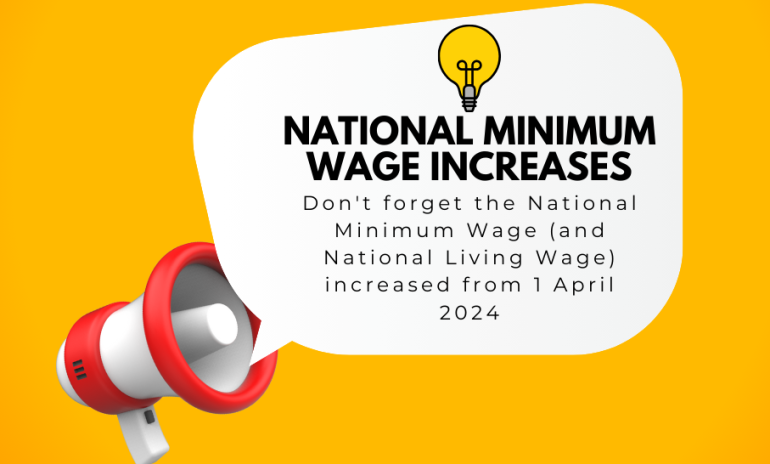What changes are happening to off-payroll working rules (IR35) and how does it affect you?
Date: 01/03/21

What are the off-payroll working rules (IR35)?
The off-payroll working rules are designed to make sure that an individual who works like an employee, but through their own limited company (usually a personal service company ‘PSC’) or other intermediary, pays broadly the same Income Tax and National Insurance contributions (NICs) as other employees.
The rules do not apply to self-employed individuals.
What are the changes to IR35?
The changes mean that the responsibility for determining whether the off-payroll working rules apply will shift from the contractor’s PSC to the client organisation engaging them.
From 6 April 2021, all public sector organisations and medium or large-sized private sector organisations will be responsible for deciding a contractor’s employment status. This includes some charities and third sector organisations.
Small non-public sector organisations are not affected by the changes, and the contractor’s company or other intermediary remains responsible for determining if the IR35 rules apply and paying the relevant tax. Workers and agencies may ask small non-public sector organisations they contract with, to confirm that their organisation qualifies as ‘small’.
A company will be ‘small’ if it has any 2 of the following:
- a turnover of £10.2 million or less
- £5.1 million or less on its balance sheet
- 50 employees or less
What to do next if you are a public sector organisation or a medium or large-sized private sector organisation?
Where a contractor provides their services through a PSC, from 6 April 2021 it is the responsibility of all medium and large-sized private and voluntary sector organisations, and all public sector organisations, to assess the contractor’s employment status for tax purposes.
The rules apply to all public sector clients and private sector companies that meet 2 or more of the following conditions:
- you have an annual turnover of more than £10.2 million
- you have a balance sheet total of more than £5.1 million
- you have more than 50 employees
If the rules apply, the client organisation, or the agency or third party paying the contractor’s PSC, is then responsible for accounting for employment taxes and NICs.
If you engage contractors you should now be taking actions to prepare for the changes:
1. Look at your current workforce
This includes those engaged through employment agencies.
- Identify individuals who are supplying their services through their own limited company (sometimes known as a personal service company) or other intermediary.
- Put in place processes to identify future individuals who work in this way.
2. Talk to individuals and agencies you engage with
- You may need information from them on some engagements.
- Share the contractor factsheet to help your contractors understand how the changes may affect them.
3. Determine if the off-payroll working arrangements apply
- Check if the rules apply for any contracts that will extend beyond, or start after 6 April 2021.
- Decide who in your organisation should make an employment determination.
- You can use HMRC’s Check Employment Status for Tax (CEST) service to make determinations.
- Look at escalations for difficult cases.
- Make a determination ahead of April 2021 - as long as the information remains correct.
4. After you’ve determined if the rules apply
- You’ll need to tell the contractor (and any agency you engage with) the outcome.
- Use a Status Determination Statement (SDS) to tell them.
5. Who will operate PAYE
- Consider if you or an agency will have to operate PAYE.
- If you’ll need to operate PAYE, put in place processes to make sure the correct Income Tax and National Insurance contributions (NICs) are deducted for engagements inside the rules from 6 April 2021.
6. Dealing with disagreements
You’ll need to set up a process to deal with any disagreements about the employment status determination. This is a legal requirement.
7. Keep records
You’ll need to make sure you maintain a robust audit trail. It is a legal requirement to keep records.
Customers will not have to pay penalties for inaccuracies in the first 12 months relating to the off-payroll working rules, regardless of when the inaccuracies are identified, unless there’s evidence of deliberate non-compliance.
Additional help
If you need additional help and support, HMRC is providing online webinars, workshops, and educational calls. See the following guidance: https://www.gov.uk/guidance/help-and-support-for-off-payroll-working
What to do next if you are a PSC providing services to a public sector client, or a medium or large-sized private sector client?
If you are affected, the organisation you are providing your services to (your client) will determine your employment status for tax. If your client determines that the rules apply to an engagement, they will give you a ‘Status Determination Statement’, which will explain their decision. You may be asked to provide your client with some information to help them make their determination.
If your client determines that your contract is inside the off-payroll working rules and you are employed for tax purposes, your client, or an agency in the supply chain, will deduct the necessary tax and National Insurance before they pay you. You will still need to submit a tax return, and the income and tax already paid arising from the off-payroll contract will be shown in the employment pages of your Self Assessment return.
If they determine that your contract is outside the off-payroll working rules and you are self-employed for tax purposes, your limited company or other intermediary will continue to receive gross payments and will remain responsible for meeting its tax obligations for that income.
Your rights
If you do not agree with your client’s decision about your employment status for tax, you can raise your concerns through your client’s status disagreement process, explaining why you disagree. From 6 April 2021, all clients are required to introduce a process to ensure that they consider your views if you disagree with their decision. Your client will have 45 days from the date they receive your disagreement to respond to you. For more information go to client-led disagreement process
If you are uncertain about a client organisation’s size, you can formally request confirmation from them. The client has a legal obligation to respond. For more information go to duty for client to confirm its size upon request
Where the off-payroll rules apply, this does not mean that you will be entitled to statutory payments or employment rights from the client you provide your services to or the agency that pays you. Salary paid to you from your own limited company may entitle you to statutory payments. For more information go to statutory payments.
If your contract is inside the off-payroll working rules how will you be taxed?
You will get relief on the tax paid when you withdraw the off-payroll income from your limited company or other intermediary, and you do not need to declare this income again when you withdraw it from your intermediary. For more information go to prevention of double taxation
For example:
John’s PSC receives a VAT exclusive payment, net of tax and Class 1 National Insurance, of £5,800. £1,000 was deducted already by the deemed employer under PAYE for the tax and Primary Class 1 National Insurance so the PSC has borne the cost of the deductions. Therefore, John does not need to pay tax or NICs again on the end of line remuneration of £5,800. If any more tax is due, for example, because of underpayment, this will be collected via John’s ITSA return.
The PSC can pay John a salary of £5,800 via a non-taxable and non-NICable payment in payroll, to ensure no more tax or NICs are deducted.
Alternatively, John could take £5,800 as dividends from the PSC and these dividends would not be subject to dividend tax.
The amount that can be paid to John without deducting tax and NICs by his PSC is limited to £5,800 as this was the amount of the deemed direct payment net of income tax and Class 1 NICs.
See ESM10030 for further information about the worker drawing money from their intermediary.
If John’s PSC were to make further payments of earnings to him, from payments not subject to Chapter 10, Part 2 ITEPA 2003, in the same period, these should be subject to tax and NICs.
You can use HMRC’s useful flowchart for contractors to check if you are affected by the changes to the off-payroll working rules (IR35).

Author: Stuart Hinnigan FCA CTA
Stuart’s career in accountancy began when he joined Preston based Moore and Smalley in 1994 following his graduation from Lancaster University. He qualified as a Chartered Accountant in 1997 and then chose to specialise in...
0 Comment
Add your Comment
We have the ability to edit and/or delete posts and comments. Links should be relevant to the topics. Please note all comments are subject to review before inclusion.














Nobody has commented yet. Why not add one?